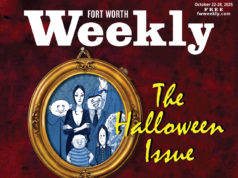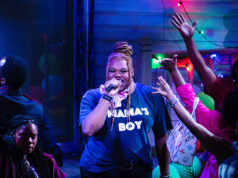You needn’t have suffered a wretched family holiday to appreciate The Long Christmas Ride Home, though it may help. Stage West is currently performing Paula Vogel’s bitterly funny portrait of one freezing-cold, treacherous Christmas shared by a family on the verge of splintering apart. As the playwright’s extended one-act unfolds, the parents’ angry, disappointed marriage sows similar romantic unrest in the adult lives of their children. Although Vogel’s passion for Japanese supernatural themes threatens to send this sharp study of domestic disintegration into the ether, director Jerry Russell and his focused ensemble of actors keep the show anchored.
Vogel thrives on material that makes audiences squirm. She won a Pulitzer Prize 10 years ago for How I Learned to Drive, a drama whose young female protagonist is forced to reconcile feelings of rage and affection for the uncle who molested her. Hot ‘N Throbbing concerns a single mother’s part-time career as a pornographer and its impact on her sexually curious children. Similarly, The Long Christmas Ride Home equates sexual desire with household anarchy. The first half of the show is narrated by the parents. Man (Bill Jenkins) is an “assimilated Jew” who has wed Woman (Lana K. Hoover), a “fallen Catholic.” He’s a serial philanderer and burgeoning alcoholic. She’s obsessed with how age has affected her looks and is contemplating an affair of her own.
This narcissistic pair has managed to produce three children, and per the author’s original concept, the kids are played by three 3-foot-tall Japanese Bunraku puppets. The puppetmasters are the actors who will, in the second half of the show, play the adult versions of the children: the temperamental oldest sibling, Rebecca (Shannon Worthington), the tenderhearted middle boy, Stephen (Josh Blann), and the guilt-ridden youngest, Claire (Ginger Goldman).
The runaway carnal thoughts of Man, Woman, Rebecca, and Stephen (the latter two have just discovered their attraction to boys) provide a white noise commentary behind the family’s Christmas observance at their local Unitarian Universalist church. In the spirit of inclusive Unitarian tradition, the minister (Ryan Manalansan) delivers a yuletide sermon that piggybacks on themes from ancient Japanese art and philosophy, including, accidentally, the slideshow image of a prostitute cavorting with a customer. The minister tries to save the moment by declaring that this Eastern chippie, like the New Testament’s Mary Magdalene, was “a working woman.” (“Mom, was the Virgin Mary a working woman, too?” whispers one of the puppet offspring). Stephen becomes fascinated with his first glimpses of Japanese culture. His character serves as the bridge that carries the Bunraku motifs of self-destructive lovers, wandering ghosts, and the inevitability of change into the rest of the play.
The Long Christmas Ride Home turns even bleaker as the family embarks to share an annual Christmas meal with the maternal grandparents (both played by Manalansan). After exposure to Grandpa’s anti-Semitic leanings and Grandma’s irritating Depression-era tendency to re-gift items she’s found in trash dumpsters, the family’s frayed nerves spark a violent confrontation between Man and Woman. The play skips forward to three related episodes in the grown-up lives of Rebecca, Stephen, and Claire. They find themselves locked out of their respective apartments by faithless or unforgiving lovers and are desperate to get back in. Tough childhood lessons on how quickly home life can collapse are repeated in adulthood as though they’d never been taught.
I can’t imagine a newbie director, however visionary, pulling together Vogel’s far-flung themes and images into anything resembling a coherent play. Veteran Stage West director Russell deserves a heartfelt standing ovation for his disciplined approach and the clear narrative line that he threads through the production. His actors establish a palpable tension between neurotic Western notions of shameful, compulsive lust and detached Eastern attitudes toward sexual chaos as a potential source of wisdom. In service to the show, the performers support one another rather than strive to stand out as individuals. They seem to take their cue from the puppet-children, whose gestures – a cocked head, a gently extended hand – are modest but effective in their detail.
The Long Christmas Ride Home is not an unqualified success. During the last third of the show, a ritual mating dance almost derails the production with a flash of superfluous theatricalism. Still, Stage West has transformed an ambitious theater piece with highfalutin impulses into a flesh-and-blood meditation on how difficult it is to integrate sexuality, domesticity, and personal satisfaction. The yearning for each constantly pulls us in different directions, but playwright Vogel seems to be saying that only the foolish reject the discord. One haunting line repeats throughout the show: “It’s amazing what people will throw away.”










